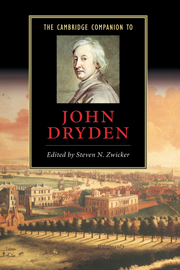Book contents
- Frontmatter
- Part 1 Pleasures of the imagination
- Part 2 A literary life in Restoration England
- Part 3 Courting and complying with danger
- 11 Dryden and patronage
- 12 Dryden and political allegiance
- 13 The piety of John Dryden
- 14 Dryden’s Fables and the judgment of art
- 15 Dryden and the problem of literary modernity
- Further reading
- Index
- Series List
15 - Dryden and the problem of literary modernity
epilogue
from Part 3 - Courting and complying with danger
Published online by Cambridge University Press: 28 May 2006
- Frontmatter
- Part 1 Pleasures of the imagination
- Part 2 A literary life in Restoration England
- Part 3 Courting and complying with danger
- 11 Dryden and patronage
- 12 Dryden and political allegiance
- 13 The piety of John Dryden
- 14 Dryden’s Fables and the judgment of art
- 15 Dryden and the problem of literary modernity
- Further reading
- Index
- Series List
Summary
Near the beginning of his elegy for Yeats, Auden imagines the poet now “scattered among a hundred cities / And wholly given over to unfamiliar affections.” The image wonderfully conjures the transformation of the poet in the lives of readers far beyond original geographies, intentions, and ways of feeling. So it has been for Dryden, except that in Dryden's case it has not been only “unfamiliar affections” to which the poet was given over. There was the immediate and there has been the lasting affection of poets - Congreve, Pope, Scott, Byron, and Hopkins; T. S. Eliot, Auden himself, and most recently Geoffrey Hill. But in his own time, and thereafter, Dryden was also “given over” to enmity, rivalry, and suspicion. And there has been a related question, from his time to ours, of location: to whom and in whose company does Dryden belong?
Should we, for example, see him among the ancients or the moderns? For us this hardly seems a question at all. On first impression, and on many subsequent visits, Dryden’s classicism overwhelms our attention: his indebtedness to Latin literature; his ability to see and hear in Restoration London the images and idioms of Rome; and the absorbing project of his last decade, The Works of Virgil in English. He is the great classicist standing midway in the line of poets that reaches from Ben Jonson to Alexander Pope. Nor is classicism only the effect of our distance; no theme was sounded more often or more eloquently in the elegies that commemorated Dryden’s death than his intimacy with the ancients. He is the living Virgil, the British Ovid, the English Homer; he improved on Lucretius, revived Juvenal, made clear the crabbed Persius, weaving ancient wit “richer in the British Loom,” refining antiquity in verse that joins “manly strength with Modern softness.”
- Type
- Chapter
- Information
- The Cambridge Companion to John Dryden , pp. 280 - 285Publisher: Cambridge University PressPrint publication year: 2004

